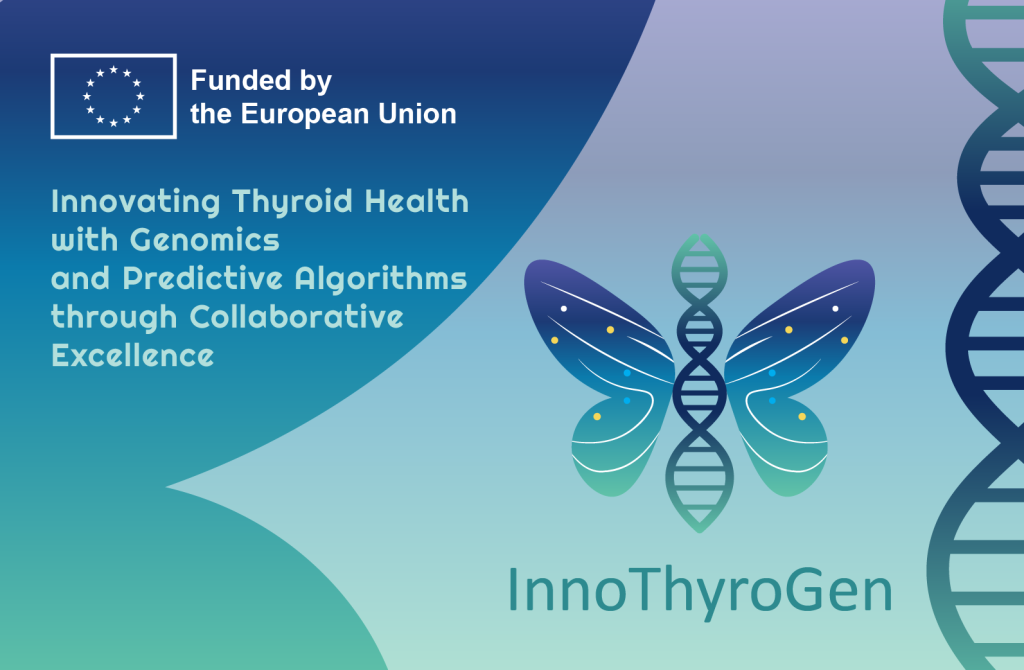Projects

02
InnoThyroGen – Horizon Europe project
InnoThyroGen is an ambitious Horizon Europe initiative dedicated to transforming the way thyroid diseases are understood, diagnosed, and treated. Launched in January 2025 and coordinated by the University of Split School of Medicine, the project brings together a multidisciplinary consortium of thirteen partners from Croatia and Serbia, including research institutes, hospitals, industry innovators, public institutions, and patient organisations.
Thyroid disorders affect millions of people worldwide, yet they are frequently underdiagnosed or inadequately managed. Conventional therapeutic approaches often fail to reflect the diverse genetic, environmental, and lifestyle factors that shape each patient’s condition. InnoThyroGen addresses this gap by advancing a personalised, data-driven model of thyroid care, leveraging the latest developments in genomics, artificial intelligence, and digital health.
The project is coordinated by the University of Split School of Medicine and implemented by a multidisciplinary consortium of thirteen partner institutions from Croatia and Serbia. These include leading research organisations, hospitals, biotech innovators, public bodies, and patient associations. In Serbia, the Institute for Molecular Genetics and Genetic Engineering (IMGGE) acts as the national coordinator. Across the consortium, the project will develop and pilot several key innovations: next-generation sequencing (NGS) pipelines for high-resolution genetic profiling; polygenic risk scores (PRS) for predicting individual susceptibility to thyroid diseases; pharmacogenomic tools that support personalised therapy selection; advanced bioinformatics solutions; and AI-driven clinical decision support systems that integrate patient data, biomarkers, and electronic health records. All these components are designed to lay the foundation for a new model of thyroid care – one that is precise, predictive, and adaptive to each patient’s unique profile.
The Office for IT and eGovernment (OITE), through the Centre for the Fourth Industrial Revolution Serbia (C4IR Serbia), plays a central role in ensuring that the wider ecosystem- spanning healthcare infrastructure, interoperability frameworks, data governance, and regulation- is equipped to adopt and sustain personalized medicine innovations developed within the project.
Project will develop a set of evidence-based policy recommendations aimed at modernizing diagnostic protocols, integrating genomic and digital tools into routine clinical practice, improving data interoperability, and ensuring that healthcare systems can efficiently incorporate personalized therapeutic approaches. These recommendations will support regulatory evolution in line with the latest scientific and technological developments and strengthen the foundation for long-term implementation in Serbia and the region.
In addition to research and policy work, InnoThyroGen will organize hackathons, expert workshops, patient-engagement activities, and multi-stakeholder events that foster collaboration between clinicians, researchers, industry innovators, policymakers, and patient communities. A key outcome of these efforts will be the formation of a Regional Network of Stakeholders in Personalised Medicine, which will further enhance knowledge exchange and cross-border cooperation.
Through its involvement in InnoThyroGen, OITE/C4IR Serbia contributes to shaping the regional future of personalized medicine, strengthening national capacities, and ensuring that Serbia is aligned with the most advanced European standards for data-driven healthcare innovation. This work ultimately supports better, faster, and more tailored care for patients living with thyroid diseases and lays the foundation for broader application of personalized medicine across the healthcare system.
